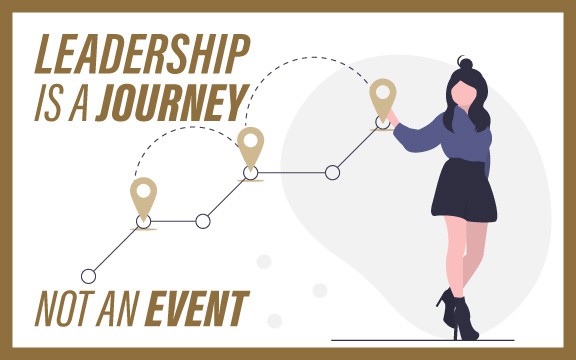Leadership is a Journey, Not an Event

We’ve been through a lot this past year and a half. Across the board, we’ve experienced disruption like none of us have ever experienced before. During this time, we’ve certainly made mistakes, stumbled our way through the constant changes and challenges, but most importantly…we’ve prevailed.
In fact, most of us might be able to look back at the past 18+ months and view them as a time of both personal and professional learning. In the professional realm, a great deal has been learned about resilience, upgrading processes to meet the demands of the current environment, what truly matters to our employees, how to be a more effective leader through times of uncertainty and more. This is all fantastic; however, I believe leadership development is a journey as opposed to an event. That said, the journey doesn’t stop here.
While the pandemic and accelerating work challenges have taken their toll on employees and leaders alike, it’s critical to think about how we can continue moving our organizations forward and developing our people to succeed, crisis or no crisis. In doing so, many people — both leaders and employees — are rethinking the ‘value proposition’ (e.g., effort vs. results, work vs. non-work, job vs. giving back) and what their purpose really is at work (personal values aligned with work).
As such, leaders face exceptional pressure to meet the business needs in this “new world”. Reverting back to our post-pandemic processes may not lead to success, and leaders now need to adjust. One way in which this can be done is recognizing that we live in a VUCA world — Volatile, Uncertain, Complex and Ambiguous.
Leaders can address the VUCA world through VUCA Prime:
- Vision – The need to have a clear direction, compelling purpose and some midterm planning toward that vision.
- The vision must balance your focus on the head (logic) and the heart (inspiration).
- Understanding – The need to listen, ask questions, have empathy and be patient.
- Motivation can erode quickly, and people are motivated by different things. People are in different places, and the same person can be in different places at different times. Understanding where people are can help you tap into the unique motivators of those on your team.
- Clarity – The need to be simple and set a reasonable focus.
- Employees need less meeting overload and less scattered scheduling. Providing clarity will help. Simple is hard — it is not simplistic.
- Agility – The ability to shift, be flexible and resist the ‘one-size-fits-all-employees’ mentality.
Agile leaders adapt their approach depending upon others’ needs and preferences. Understanding these needs and preferences can help you be versatile when coaching others.
Beyond the Blog
For questions, more information or team pricing, contact Betty Jones-Bliss at 217-549-2883 or bettyso@purdue.edu.
RELATED POSTS:
Optimizing Sales Management: Knowledge, Coaching and Continuous Improvement
While we used to think that exceptional salespeople possessed an innate gift, recent data suggests the impact of today’s sales managers in nurturing and refining this gift to unlock its fullest potential.
A great moment for value-based sales in agribusiness
Value-based sales can empower companies to craft compelling value propositions, understand the customer’s business model and effectively communicate to stakeholders.
How can big data empower the development of new products?
Data is one of the most powerful resources for a company. It enables accurate decision-making and minimizes risk, ensuring greater revenue and sustainable growth.
